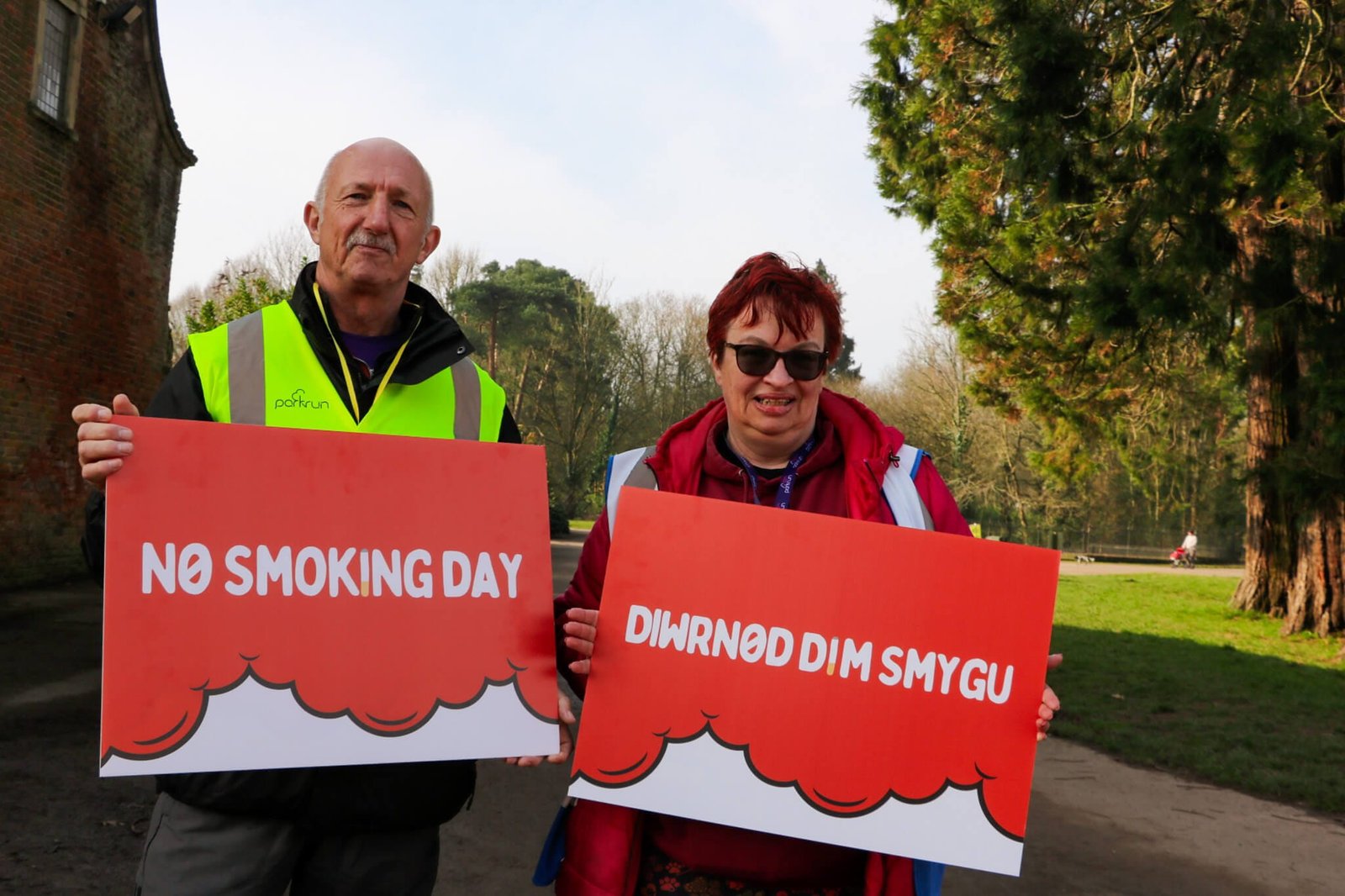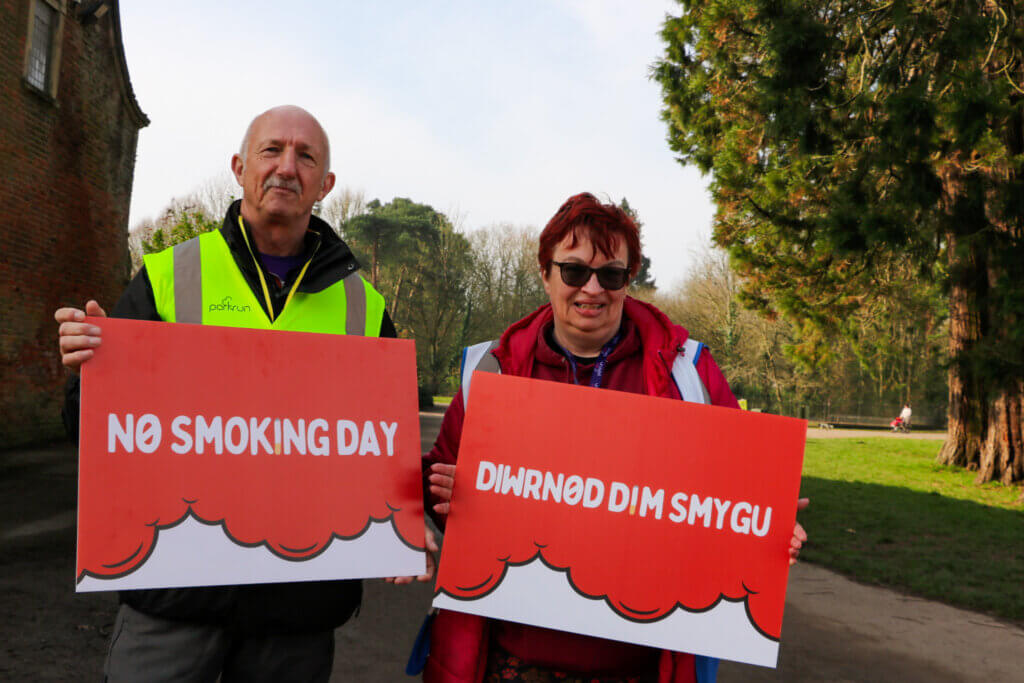- Welsh Government launches a new tobacco control strategy, which sets the pathway for a smoke-free Wales (less than 5% of the adult population smoking) by 2030.
- The new Endgame strategy aims to significantly reduce the harms of smoking in Wales.
- Smoking still kills over 5,000 Welsh adults every year.
- The ambitious strategy strives to end the tobacco epidemic
- Smoking is one of the main causes of health inequalities in Wales, with harm concentrated in disadvantaged communities and groups.
Welsh Government has launched an ambitious new tobacco control strategy for Wales, which seeks to secure a smoke-free society, less than 5% of the adult population smoking, by 2030. The strategy lays out firm actions and polices with the aim of finally ending the tobacco epidemic in Wales.
The smoking addiction has gripped the nation for over 100 years, and despite the known risks, still kills 5,600 people in Wales every year. Smoking is the leading cause of premature death and preventable ill-health in the country and is estimated to cost the Welsh NHS £302 million each year.
The National Survey for Wales currently places adult smoking prevalence in Wales at 13%. While this figure slowly declines, reaching 5% by 2030 will require a significant upturn in actions and commitment. Modelling by Cancer Research UK in 2020 indicates, if the current pace of actions continue, Wales will not reach a smoke-free future until 2037.
Wales’s leading tobacco control action group ASH Wales says the nation is firmly behind the new strategy which provides a solid blueprint for achieving a smoke-free society. Suzanne Cass, CEO of ASH Wales, said:
‘’Public support for an Endgame target is overwhelming, 73% of Welsh adults want Wales to become smoke-free. Welsh Governments’ commitment to this target is welcome, however, this bold strategy is going to need bold and decisive action to hit that 5% target by 2030.”
The publication of the new strategy has been eagerly awaited by other health charities across Wales. Katie Till, Cancer Research UK’s public affairs manager in Wales, said:
“Smoking remains the biggest preventable cause of cancer and is responsible for around 3,100 cancer cases in Wales every year. Achieving a smoke-free Wales by 2030 would save lives. For Wales to hit this target, we need to see ambition in the way we support people to quit and prevent people from starting.
“Smoking is also the single biggest driver of inequalities in life expectancy in the UK. It’s critical the plan addresses this, so fewer people are affected by the harms of smoking in the future.”
Nearly 140 years have passed since the first UK manufactured cigarettes entered the market. Since then, sales soared in the first half of the twentieth century and brought with it what health organisations coined as the ‘global tobacco epidemic’. This epidemic has waged for decades, and currently claims the lives of 8 million people globally each year.
A recent review of tobacco control commissioned by the UK’s former Health Secretary, Savid Javid, speculated that if cigarettes were to enter the British market today, they would simply be turned away and would not be legalised.
Despite decades of research, lobbying and national stop smoking campaigns, tobacco remains on the UK market, and remains the only legal consumer product that kills up to half its users when used as intended.
As the Welsh Government launches its new tobacco control strategy, it embarks on a road which carries the potential to end smoking’s hold on national health. Welsh Government has been bold with this task, which is reflected within its 5% Endgame target.
On a global scale, other countries have pledged similar ambitions in achieving a 5% smoking rate: including England, Scotland, Ireland, New Zealand, Canada, and Sweden. Internationally, 5% is often regarded as the benchmark in which the tobacco epidemic is considered unsustainable.
The Strategy
The new strategy will center on limiting smoking’s impact to health, children, finances and the environment. To achieve this the strategy will employ a series of delivery plans, which will focus on the following areas:
- Smoke-Free environments
- Continuous improvement and supporting innovation
- Priority groups
- Tackle illegal tobacco and the tobacco control legal framework
- Working across the UK
Each area will hold equal importance and will be reviewed at the end of a two-year delivery period.
Smoke-free Environments – Welsh Government has led in this field, in 2021 Wales became the first UK nation to introduce smoke-free hospital grounds, school grounds and playgrounds. Studies have shown smoke-free legislation reduces exposure to harmful second-hand smoke, as well as having an impact on changing attitudes towards smoking. The new strategy will consider how to expand and support existing smoke-free legislation.
Welsh surveys show majority support for smoke-free legislation, particularly around smoke-free spaces that protect children. A recent YouGov survey (2021) of Welsh adults conducted by ASH Cymru revealed:
- 81% believe smoking should be banned in outdoor areas where children play sport.
- 67% would support banning smoking in outdoor eating areas, of all restaurants, pubs and cafes.
- 67% would support a ban on smoking in all cars, up from 63% in 2017.
Within this workstream, the Welsh Government has committed to supporting UK efforts in reducing the environmental harms of smoking. The global health community has been vocal on this front, as figures issued by the World Health Organisation estimate that 4.5 trillion cigarette butts are discarded each year, which in turn leach microplastics and toxins into the environment.
Continuous improvement and supporting innovation will also be a staple of the new strategy. Within this workstream Welsh Government committed to supporting and developing the national stop smoking service, ‘Help Me Quit’.
In Wales, the national stop smoking service provides support around 3% of current smokers every year. The new strategy marks that despite progress, Wales is still creating a new generation of smokers, as 4% of 11-16 years are still currently smoking in Wales. In light of this, the strategy outlines plans to enhance prevention, cessation and the use of innovation.
The strategy also lays out a firm commitment to a systematic opt-out quit smoking programme for all patients admitted to hospital. Under the scheme all in-patients will be offered specialised stop smoking support and Nicotine Replacement Therapy. This national approach will once again put Wales ahead of other UK nations in the implementation of actions to support smokers to quit.
This workstream will also examine how e-cigarettes will fit within the modern health landscape of Wales. Currently, national surveys show e-cigarettes are the most popular stop smoking tools in Wales.
The current evidence indicates e-cigarettes are significantly less harmful than smoking tobacco, and can help people to quit smoking, when combined with behavioral support. Welsh Government has committed to exploring their role as possible tobacco quitting aid.
Supporting priority groups will be a key cornerstone of the new strategy. In Wales, higher smoking rates are reported within certain groups, for example adults from socio-economically deprived backgrounds, routine and manual workers, and some ethnic minority groups in Wales. In addition, latest data from SHRN indicates that children from less affluent homes are twice as likely to smoke than their more affluent counterparts.
Research has shown that higher rates of smoking increases the likelihood of groups experiencing poorer health outcomes, which in turn impacts life expectancy. Levelling out the health landscape in Wales will involve the strategy ensuring that all groups, regardless background, are given the right support to stop smoking in Wales. This area will address the national health disparities caused by smoking.
The new strategy will also enhance efforts to tackle the illegal tobacco market in Wales, which will include a review of tobacco enforcement tools that are used to deter underaged sales.
Welsh Government have already taken proactive steps to address the illegal market, as earlier this year it launched a national illegal tobacco campaign. The ‘No If No Butts’ campaign was launched in January, which included the unveiling of a national reporting platform. So far, the campaign has been viewed over 4.9 million times on social media, and has led Welsh enforcement to significant seizures of illegal tobacco.
Last year, HMRC and Welsh Trading Standards teams seized an estimated 2.84 million cigarettes and 404kg pouches of hand-rolling tobacco from illegal market in Wales. The new campaign seeks to combat market prevalence, while raising awareness around how illegal sales act as a gateway for children to start smoking.
In context to the UK landscape, the new strategy commits to working with other UK Government’s on tobacco control action and policy. This will include regulations on safety warnings and raising the age of sale of tobacco. Currently, Wales does not have the power to independently raise the age of sale of cigarettes.
The new strategy and first phase delivery plan has been published in both Welsh and English, and can be found at: www.gov.wales
ENDS
REFERENCES & NOTES
- The new strategy will be published on the 26th of July 2022 , 09:30.
- The first manufactured cigarettes in Britain are often attributed to W.D. & H.O. Wills in 1883.
- The World Health Organisation’s estimate on global annual deaths caused by smoking (8 million), found here.
- Smoking remains the leading cause of premature death and preventable ill-health in Wales, found here and here.
- NHS Wales spends an estimated £302 million each year on smoking related disease, stat found here, here and here.
- Estimates from the Public Health Wales Observatory place annual deaths caused by smoking at 5,000, found here.
- Review commissioned by the UK’s former Health Secretary, Savid Javid, found here.
- Tobacco is the only legal consumer product that killsup to half its users when used as intended, found here.
- Welsh Government Endgame target (5%) found here.
- 5% is understood to be the threshold at which the tobacco epidemic could become unsustainable, found here and here.
- National Survey for Wales stats stating Welsh adults smoking prevalence at 13%, found here.
- Modelling conducted by CRUK in 2020, found here.
- Studies show that smoke-free legislation reduces exposure to second-hand smoke, as well as changing attitudes, found here.
- ASH Cymru YouGov Survey (2021) found here.
- World Health Organisation stat marking 4.5 trillion cigarettes are discarded into the environment each year, found here.
- 3% of Welsh smokers use national stop smoking services each year, figure found here.
- 4% of 11-16 years are still smoking in Wales stat and reference found here and here.
- Additional information about the Ottawa model can be found here and here.
- National Survey for Wales bulletin showing e-cigs are the most commonly used quitting tool in Wales, found here.
- Evidence reviews assessing relative safety of e-cigs, found here, here and here.
- Cochrane review on e-cigarettes use within smoking cessation, found here.
- SHRN survey found here.
- ASH UK briefing document on smoking and health inequalities within different population groups, found here.
- ‘No Ifs No Butts’ campaign reach stats issued by Welsh Government, 2022.
- 2021 illegal tobacco stats released from HMRC to ASH Cymru, found here.
Supplement Paragraphs
Raising the age of sale of tobacco in Wales
Within the new strategy, the Welsh Government will continue to work with UK Governments on a range of non-devolved issues, such as raising the age of sale of tobacco. Currently, Wales cannot independently raise the age of sale, as this area of legislation sits within the remit of UK Government. If the age of sale were raised, the Welsh Government would work closely with the UK administrations on its detail.
Last year, the former UK Health Secretary, Sajid Javid, commissioned an independent review into how England could realise its smoke-free ambition. The review, led by former Barnardo’s CEO Javed Khan OBE, provided four ‘critical’ recommendations which would need to be actioned if England were to ever reach its own smokefree target.
One of the ‘critical’ proposals included raising the age of sale of cigarettes, by one year, every year, until a no one would be able to purchase tobacco in the country.
When asked if the Welsh Government backed this recommendation, a Welsh Government spokesman said:
“We support measures to strengthen the regulatory framework on tobacco and nicotine products, particularly those designed to reduce the number of young people who start smoking.
‘We would work closely with the UK government if proposals were developed to increase the smoking age from 18.”
Khan’s proposals, released last month, have yet to be agreed by the UK Government. In addition, the Government is yet to issue a comprehensive tobacco control strategy for England, and in turn provide a plan to achieve it’s smoke-free ambition.
According to the tobacco control charity ASH Cymru, the review pulled into focus that stagnation from UK Government hinders Wales’ own tobacco control efforts. Suzanne Cass, CEO of ASH Cymru said:
“The Khan review is clear in what England needs to do to realise its own smoke-free target.
‘Inaction on this front will not only impact England’s chances to becoming smoke-free, but may impact Wales’ own, as many key tobacco control measures rely on Westminster, such as raising the age of sale.”
ASH Cymru has been vocal in its support for raising the age of sale and have highlighted that this measure could significantly reduce smoking rates in Wales.
The charity points to US evidence which found that raising the age of sale from 18 to 21 in certain states reduced smoking rates in that age bracket by 30%. It is widely accepted that smoking is an addiction which is often starts in childhood or early youth. A survey conducted in 2020 by ASH Cymru showed that the vast majority of smokers in Wales started smoking before the age of 18 (81%). ASH Cymru believes that raising the age of sale of cigarettes would help limit access to youth, and in turn help limit the chances of lifelong addiction.
References & Notes









